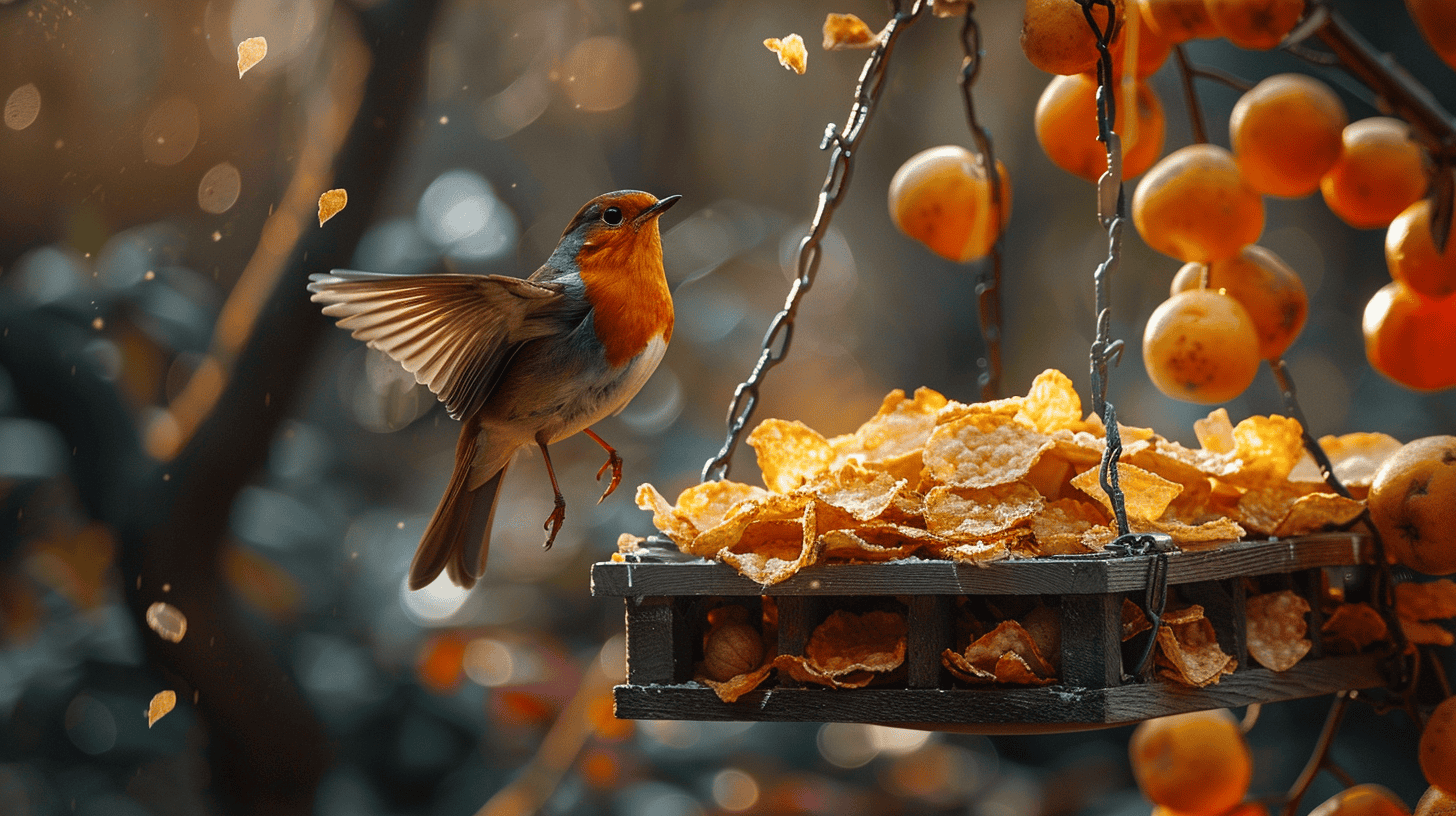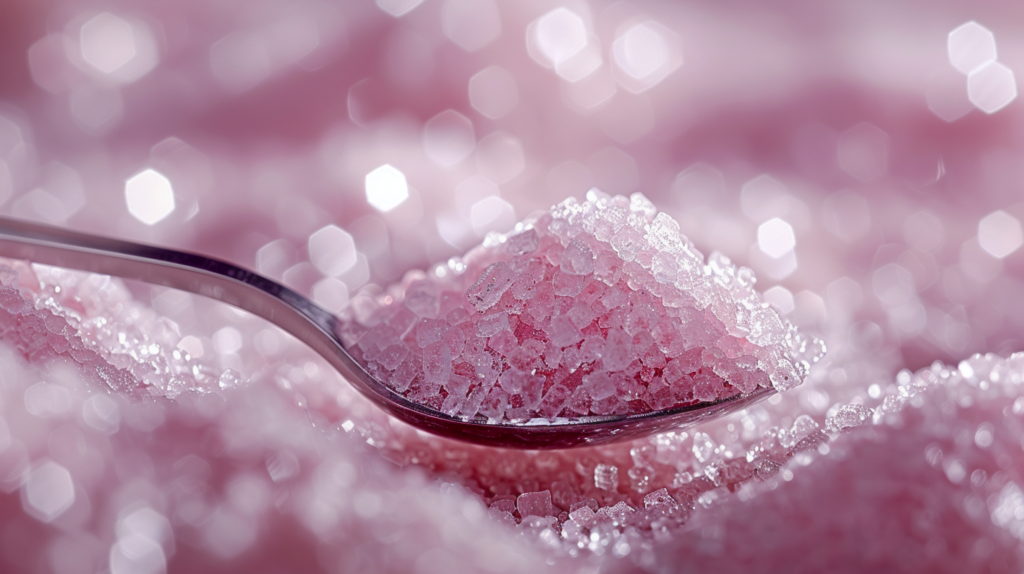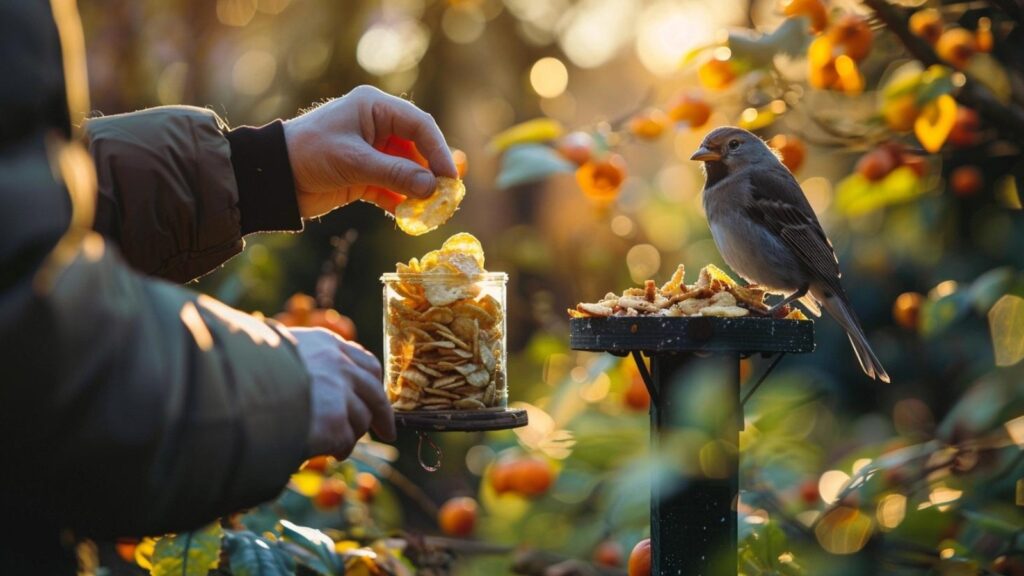Feeding birds the wrong food might make them sick or worse. My guide will ensure you remain a responsible birder and don’t accidentally harm your local birding population with a surprise recipe.
Although wild birds share many of our dietary staples, some foods make them sick or simply don’t give them any nutrition.
Below are 14 common (and less common) foods you should never put in bird feeders. Some of these you’ll no doubt already know, while others you may be using as bird feed right now!
Potato Chips

This delicious staple may seem harmless since they’re made out of potatoes, but they’re one of the worst things you can feed a bird. Many potato chip brands are loaded with fats, oils, and/or spices that could make birds very sick.
Even if you feed a bird plain potato chips, the high salt content could potentially kill them. This outcome is due to birds having a faster metabolism than we do, meaning even a small amount of salt goes through their system quickly.
Salted Nuts or Roasted Nut Bags

Another common food people mistake for birds are bags of nuts. These snacks may seem like an easy source of bird feed at your local grocery store, but they’re often covered in sugar and salt — two forms of bad news.
Similar to potato chips, salted nuts are simply too high in sodium for a wild bird’s fragile system. Excess sugar also damages their system since it increases the chance of gastrointestinal issues, such as difficulty digesting or passing stool.
Fruit Pits, Seeds, or Modified Fruit

Many wild birds love eating fruit, but that doesn’t mean you can put any fruit in your feeder! Fruit pits and fruit seeds not only provide little nutritional value, they’re easy for them to choke on.
Some birders also attempt to feed wild birds with canned fruit or bags of dried fruit, which could be harmful due to added syrup and sugars. Even a sugar-free can may still be too sweet for a bird, so it’s better to be safe than sorry.
Chocolate

Fun fact: chocolate is actually quite healthy when it’s not filled with a bunch of fat and sugar. Not-so-fun-fact: it’s still bad for birds and can make them severely ill.
Chunks of Bread

The romantic image of tossing bread crusts to swimming ducks is undergoing a serious makeover. More and more information is coming out about the downside of feeding bread chunks to wild birds.
The main reasons for this food being harmful are the lack of nutritional value and how it impacts the bird’s ability to feel hunger. First and foremost: most bread brands don’t offer much in the way of vitamins or minerals.
Granola Bars

A granola bar may be the ultimate meal when you’re low on time and need to rush out the door, but they’re not healthy for birds. This food is very easy to mistake for safe since it’s often touted as healthy or all-natural.
How can grains and nuts possibly be bad? Similar to the other items on this list, granola bars are often mixed with all sorts of harmful chemicals, flavorings, or sweeteners.
Honey

“Wait, how can honey be bad for birds?”, you might be asking. It’s an all-natural sweetener that comes from beehives, so certainly, it’s not toxic or lacking in nutrients.
Sadly, honey is simply too sugary for a bird’s delicate constitution. Similar to sugary granola bars or sugary canned fruit, honey can impact a bird’s ability to digest food or pass stool.
Some birders have the misconception that honey can be put inside or near hummingbird feeders, too. Hummingbirds should only be given clean water with a plain white sugar mixture to mimic their favorite native plants — nothing else!
Cheese (or Any Dairy Item)

As someone who has a mild lactose intolerance herself, I can relate big time to this section of the list. Birds don’t have the lactase enzyme in their body, the digestive protein that helps the body break down lactose for digestion.
While humans with lactose intolerance may get bloated or gassy after eating a dairy product, birds can become severely ill or die.
Any dairy item is a no-go – cheese, yogurt, products with cheese dust on them, you name it. The next item on the list will seem surprising compared to dairy, but it can be just as problematic.
Dry Beans

Humans can’t eat dry, uncooked beans since they contain a compound called lectin. All beans have this compound, so cooking them thoroughly is essential to make them safe for consumption.
Failing to fully cook beans can lead to all sorts of painful complications like diarrhea or vomiting. As it stands, birds also can’t eat dry or undercooked beans – unlike us, they can’t just swing by the hospital if they accidentally do.
It’s best to steer clear of beans entirely since they’re not a staple food for birds of any form, anyway.
Onions

Savory and delicious, onions seem like a no-brainer when supplementing food…just keep them away from your feeder! Their high acidity content and trace amounts of sulfur are one of the deadliest kitchen staples for bird populations.
Garlic

While garlic may be a beloved addition for people, it’s an acidic ticking time bomb for birds. This kitchen staple also damages the intestinal tract of birds and can cause all sorts of painful problems.
Whether it’s fresh or cooked, garlic needs to stay out of your bird feeder.
Avocado

There are quite a few misconceptions about avocado for birds, with some birders thinking it’s safe since an avocado is technically a berry. However, this fruit is one of the most dangerous additions to a bird feeder on the list.
Xylitol or Any Artificial Sweetener

If you think sugar alternatives can fill the gap left by honey or white sugar, think again. Artificial sweeteners are incredibly dangerous for birds, particularly pantry staple xylitol.
Xylitol may be a natural sweetener found in everyday foods like oats and corn, but it’s still too strong for a bird’s constitution. Attempting to eat this can throw off the bird’s metabolism similar to sugar, affecting everything from their heart to their digestive system.
Alcohol

This last item may seem like a no-brainer. Why would you feed wild birds a shot of vodka or a can of beer?
The thing is, alcohol can crop up in surprising places if you neglect your bird feeder. To understand how this works, it’s time to dive into some science – don’t worry, I’ll keep it simple.
Alcohol forms through a process called fermentation. When certain foods are left out for a long time, bacteria can start to form on the surface – if any yeast lands on this surface, they eat the bacteria.
Some foods ferment very easily, like ripe bananas or juicy berries.

